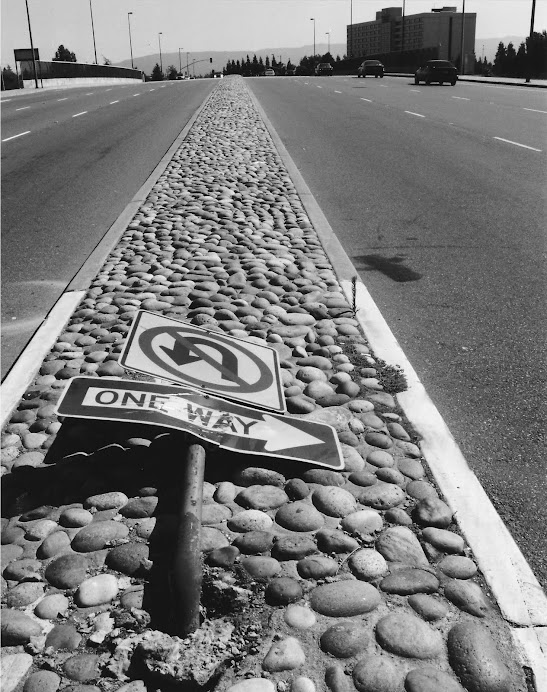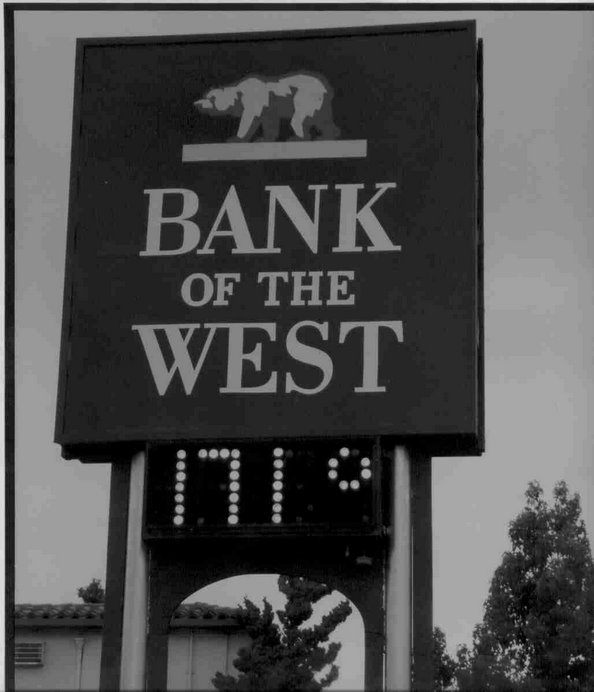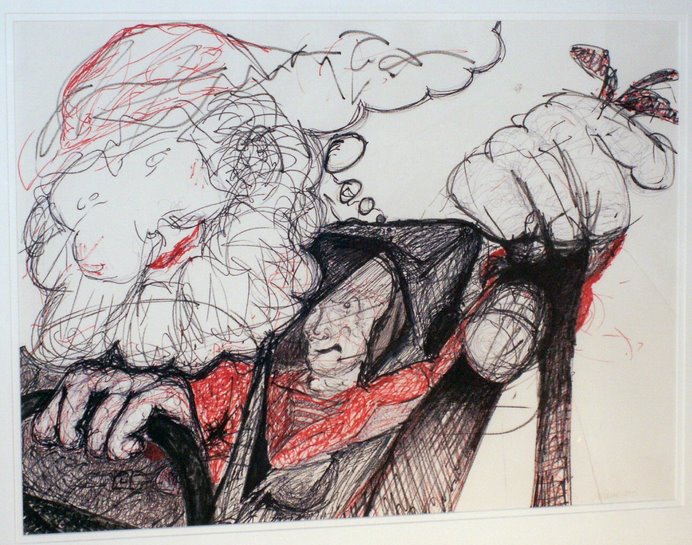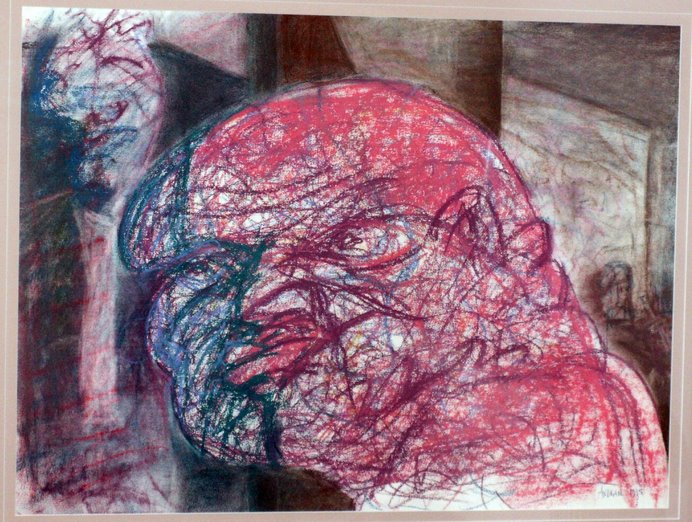It was all episodic; all coincidental. It didn't matter what choices were made; all actions were in the flow, and you did them and just forgot them because you couldn't change them, you couldn't do it differently. The moment had past.
Begin at the beginning. That's what logic says. Commence. Embark. Meaning begins with a single thought. The Big Bang. Pow. The cogito: I think therefore I am. Voila.
But one finds that with anything one begins, there is an inevitable turn back to view what you have accomplished. Along with this craning of the neck and refocusing on recollection come hopes of acquiring more inspiration to continue and foreclose the ideal. Bang! You're here, and you're doing, shaping, thinking. You formulate goals and ideals towards which you strive. Then those are measured, noted, and thrown back into the grinder to be broken down further into even finer bits. One inevitably begins again and again, each time at a different ground zero, refining the original vision into another. The ultimate is re-evaluated, the infinite redefined. In turn, a dream is resuscitated, reborn; it steers clear of the stale, static square box and blooms into yet another circle. The whole experience of "reaching for the stars" (as Kasey Kasem would have put it) can be likened to dropping a pebble in a puddle. The waves reach out in all directions, ripple upon ripple, circle upon circle, expanding the sphere of existence to encompass more of the imagined. One circle is created, and another pops up right behind it, from the same point of origin, moving the same speed as the bigger circle in front of it, and the smaller one that jumps up behind it. Eventually, the ripple spreads the length of the water's surface to encompass the experience, bank to bank. Or the ripple reaches a point where it starts to wonder if there are any limits that it can reach...
"What?" said the man, folding his newspaper down to reveal a frown of disbelief.
Thistle inventoried his recollection. He wasn't sure what he had been saying, exactly. He was just trying to make conversation, make the task of sharing a table with a stranger a little less cumbersome. He often had experienced an uncomfortable reception that he likened to his slovenly appearance. But this was usually dismantled with a little practice of social skills. "Well, I was just asking if you were done with the sports section," he said, guessing.
The newspaper was folded and set down, no longer the first priority of attention. "You say that you can see into the future?" The man who asked the question seemed to have, deep below his rough, razor-burned and pocked complexion, a desire to believe Thistle.
"I don't want to frighten you," said Thistle, recovering his thoughts. "I just kinda talk. Like to. Don't do too much. But talk."
"That's mm-nice," said the restaurant patron. There was a sense of discomfort in his expression. Thistle empathized with him, not only because of the known discomfort of the average restaurant nook, but because of the hints being forecast in his own mind that his vertical hold on the reality channel was slipping. He could barely grasp the remote with the feeble fingers in his mind. Yet he summoned the strength to point his sights directly at his subject and continued searching for the button that would enable a connection between the minds involved in this conversation.
Thistle’s mind crackled with potential. He sensed that a well told story could be of great worth at this exact point in time, if only he could find the right hook that would enable his audience to suspend their disbelief beyond the greatest unknowns that the collective imaginative universe withholds.
“You see," Thistle said, "I've had a lot of pain. Rejection. Ridicule. I've lived through much persecution to continue talking. And so I should, in accordance with all national and state regulatory policies, exclaim all appropriate disclaimers and require my listener's consent. It's against my nature, but it seems to save a lot of trouble."
"I'm listening," said the restaurant patron, settling into the orange vinyl nook with sounds of amplified flatulence.
"First," said Thistle, "I need a glass of water."
Thistle could take the past and move it forward. He could see the trends of the now, study the trends of the past, and advise for the trends of the future. He held the ability to make a killing on the stock market, if he desired. But he didn't, as you might have guessed.
He wasn't like anyone that you might know for the assertion of one’s individuality. He wasn't a Kurt Cobain or a Jack Kerouac.
He was not as much of a storyteller as he was a talker. He was not as much of a drifter as he was a wanderer. He was not as much of a philosopher as he was a thinker.
He was not Gayatri Spivak. He wasn't a Feminist Marxist Deconstructivist. Oh No. Thistle was more like the guy that they used to let pump your gas for you until it became more economical to do it yourself. Not someone you would expect to be able to map the future.
But the fire that burned in the belly of the body that encompassed a self concept identified to other self concepts as Thistle Penn was not a raging, acre scorching blaze; it was more of a pilot light. Hard to blow out, some of those pilot lights. And they just keep burnin' right along at an even, balanced pace, getting the job done, stepping ever closer to their destiny, ever closer to the doorstep of fate, where all becomes evident, and everything makes sense.
At this point in his life, Thistle didn't concern himself with his ultimate fate. He wasn't too worried about making sense. He was more worried about Speed. He had memories of a time in his past when Speed was very important to him. Not the speed that you ingest for its narcotic effect, but the concept of Speed. Take the Type A personality. Speed is important to this type of person. He lives life very fast. Efficiency means getting a lot of things done in as little amount of time possible.
There was a time when Thistle was very adamant about being efficient. Obsessively. As I said, Speed was very important to him. He wanted to learn and solve and create and construct. To experience the lifetimes of centuries into his own, to transfer the work of thousands of theorists and philosophers and scientists and wise men from all the cultures and societies of the world to the clay tablet of his mind and sculpt something even more dynamic, more controversial, more innovative, more genius than had ever existed before him-- that he could call Thistle Penn. That he would be known for and identified with.
The Thistle Penn Universe.
But that was in the past. That was years ago. That time was lost. Thistle now thought mostly about the moment just before the water in the glass that he tipped towards his lips touched his tongue, and then the feelings as it swished in his mouth. He didn't analyze why it swished or how it swished or even if it was a good or bad feeling. He just swallowed the water. Then he would set the glass down on the table.
It used to be coffee. Espresso. The name even implies speed. Express. Fast. He used to have a coffee maker that could have a piping hot pot of coffee ready in five minutes. And the rush-- caffeine was much more motivating than beer. Or water. Just a cup or two and he was out of his seat and doing things. Mailing letters, typing resumes for friends, making lists of book ideas. With coffee, sleep became a secondary need.
He used to be able, on one pot of coffee, to type a twelve page research paper in one day-- composing as he did the research. And that was after a night of drinking beer and wine and smoking pot until two thirty in the morning. He'd get up at ten or eleven and start the coffee, and by the time he had his books set up, the first cup was ready. Top of the mornin' to ya. Better than Cornflakes.
Now he liked to mellow more. He didn't think quite as much as he used to. He quit drinking coffee. It was important, he felt, that he had drank coffee for that period in his life (ah, youth!). And as far as drug use goes, from what he’d heard, it was a lot easier habit to break than cigarettes.
So water and the non-smoking section for Thistle. He didn't want to chance getting roped into that vice. He had wondered at the plight of the smoker a lot when he was pounding mugs of java. Now, he saw the smoke, and sometimes he watched it trail up around the ceiling fans and out restaurant windows, filtered slightly by the dusty screens in the summer. Other times he smelled it and tasted it along with his wheat toast or the first drink of water. But rarely, anymore, did he really think about it.
Once Thistle had his water, he sipped and swallowed, and then began breathing slowly. In through his nose...out through his mouth. Repeatedly. He found that if he tried to talk without relaxing, the words tended to fight with each other over who should come out of the mouth first.
Synthetic creaking rose from the nook as the restaurant patron adjusted himself in it. His right eyebrow arched high into his brow while the left one was stabbing at the bridge of his nose. But he was focused, interested. Listening.
"There was a house," said Thistle. " It was a simple house; two story, late 19th century construction, painted all-purpose white, perched on the hint of a slope in the middle of a pocked and gopher-infested one acre lot. It had come under general misuse in the past twenty years. Downstairs held as its tenant a Vietnam war veteran who had to drive out of town in order to go drinking, because all the local bars had thrown him out one too many times and, as he put it, "don't deserve shit." The upstairs was rented out to college students, and sustained the life of at least two and as many as six people over the course of a semester, depending on the quality of the drugs. It was a very metaphysical, psychologically transcendent location, and so it had a grand effect on the minds that played there."
The restaurant patron watched Thistle pause and sip his water. The glass was half-full. (Or half-empty, depending on your perspective.) The patron was fixed in his condition; same perplexed expression, arms propping up his head, elbows matted in with his placemat. He thought about stopping the old man to clarify things, make sure they were understanding each other. Who could know where he might go with all this? Maybe the answers to the questions would come without them having to be solicited. His breathing was slow and continuous; circular.
The more than empty and quite less than full glass of water settled down into the meniscus of condensation waiting like a primered gasket on the waxy finish of the restaurant nook's table. Thistle wiped the dampness transferred from the glass to his fingertips onto the tips of his mustache and spread it down along the sides of his face; thumb, finger, and excess moisture converging at his chin.
"It was at this house that I learned just about everything I'd ever wanted to learn one day," he continued. "I had arranged for the day off from work so that I could spend it with my friends. They wanted to do some LSD."
The restaurant patron leaned back. "LSD, huh?" he offered, intimating his discomfort, eyebrows spreading wide. His breathing became tensed.
"One more time."
Yet another one more time.
Thistle's mind began to reel with remembrance and formulation.
Just once more, Just once more. Just one more hit. This time it'll be different. Just one more little puff. Then I'll stop.
Ah, what the hell. What difference is one more gonna make?
Just once. I'll go to the bar one more time, and then that's it.
Just once. All it takes to rock the world.
Subscribe to:
Post Comments (Atom)







1 comment:
This is getting really interesting...
Post a Comment